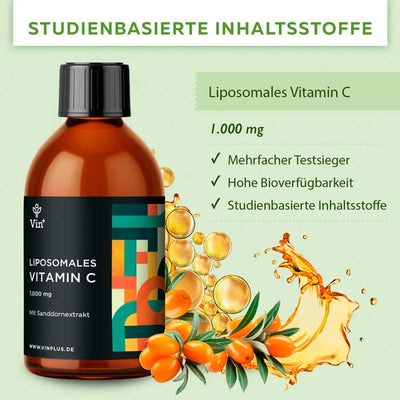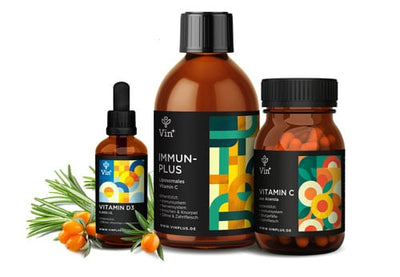The immune system is used to ward off infections that are caused by viruses, bacteria and other pathogens that are floating around in our environment and can make us ill. However, since the body is constantly exposed to them, our body's own alarm and protection system has formed. It is not an independent organ, but an amalgamation of several organs such as the intestines, the skin or the thymus glands.
Is the immune system already fully developed in the prenatal stage of a child?
The systems for the immune system are already present in the fetal stage, such as the defense cells, the white blood cells, also known as leukocytes. However, the immune system is still incomplete at birth and is constantly evolving.
Part of the defense mechanism is therefore called innate or adaptive and is the first measure that takes effect when an infection occurs. The part of the immune system that develops through constant contact with the environment, also called specific or acquired defences, gradually produces a memory system which, like memory, stores information about how to react as quickly and effectively as possible to pathogens.
Already knew? Everyone's immune system is different! Therefore, there are fundamental differences in resistance to disease, susceptibility varies as well as potential disease progression!
What are the most common causes of a weakened immune system?
- (permanent) stress
- lack of sleep
- nutrient deficiency
- dehydration
- alcohol and nicotine consumption
- hyperglycemia
This is how you get your immune system going again!
- Try to reduce stress where possible and balance the physical and mental stress with relaxation exercises or practices such as meditation or yoga. Even the busy ones can significantly reduce their stress levels with up to 15 minutes of meditation!
- work it baby During sport, the cells produce messenger substances that have an anti-inflammatory effect and thus fight off pathogens. But beware of the open-window effect! In immunology, this term describes the phenomenon that athletes by overstressing their bodies encourage gaps in their immune system. A little tip: change your clothes immediately after exercising, take a shower and compensate for the loss of fluids!
- Enough sleep ensures that the immune and metabolic systems can regenerate, prevents unpleasant, body-damaging consequences such as irritability, disorientation and, above all, an underfunction of the entire immune system!
- Healthy food, good mood! Your dietary habits contribute to how well your immune system works, so eat the rainbow, taste the rainbow! Important nutrients for a varied and balanced diet are vitamins (e.g.: A,B12,C,D), trace elements (iron, iodine) and minerals (calcium, magnesium). If you eat varied, colorful food and keep the balance between the different foods, you can adequately cover your basic daily needs! Especially important: the food should be fresh! If they are also regional, it's not only healthy, but also sustainable!
Little hacks: For vegetables and fruit, the “take 5” rule applies; do without salt, as many products already contain it; reduce your sugar intake to avoid type 2 diabetes mellitus, the so-called age-related sugar, which meanwhile has hardly anything to do with age; try to minimize the consumption of red meat as studies show that it increases the risk of colon cancer enormously! And above all: Stay hydrated!
- Get out in the fresh air, every day! Not only does exercise outdoors strengthen the immune system, but also - all sun worshipers watch out! - Fill up on solar energy and fill up your vitamin D storage! Don't forget sunscreen and a hat to protect yourself from sunburn or heat stroke!
- take vitamins! Support the body's own production of the sun vitamin, for example with vitamin D supplements in addition to a nutrient-rich diet. At www.vinplus.de you will find even more supplements that boost your bodily functions holistically!
In which groups of people can a potential vitamin D deficiency occur, for example?
In addition to people with a metabolic disease or older people, this also includes pregnant women and women in the (peri)menopause, since vitamin D is also important for the female hormone balance and fertility. The female fertility and hormonal cycle has certain peculiarities, depending on the current phase of life. Two of the peak phases in a woman's fertility span are pregnancy and menopause, also known as menopause. The period between menarche and menopause usually ends in the late forties or mid-fifties. Where fertility is initially high, it begins to decline after the age of 30, until the probability of pregnancy and the hormone production required for this ceases. Due to the constant change of the body and the corresponding adaptation of the different body-internal households, the awareness of an age-appropriate lifestyle is essential!
But be careful: not every individual who falls into the above groups of people is automatically affected by a deficiency! Since different factors play a role, you should always consult your family doctor before taking supplements!
Sources:
- Immune system source: Ph. Christen, R. Jaussi, R. Benoit, Biochemistry and Molecular Biology, DOI 10.1007/978-3-662-46430-4_32, © Springer-Verlag Berlin Heidelberg 2016
- Immune system: https://www.gesundheitsforschung-bmbf.de/de/fektionen-und-immunsystem-6443.php
- Health: https://www.bundesgesundheitsministerium.de/fileadmin/Daten/5_Publikationen/Praevention/Broschueren/2016_BMG_Praevention_Ratgeber_web.pdf
- Meditation/ stress relief: Christopher J May, Brian D Ostafin & Evelien Snippe (2020): The relative impact of 15-minutes of meditation compared to a day of vacation in daily life: An exploratory analysis, The Journal of Positive Psychology , 15:2, 278-284, DOI: 10.1080/17439760.2019.1610480
- Nutrition: https://www.thieme-connect.com/products/ejournals/html/10.1055/s-0042-107692#N71147
- Vitamin D Intake: Bouillon R, Carmeliet G, Verlinden L, et al. Vitamin D and human health: lessons from vitamin D receptor null mice. Endocr Rev 2008; 29:726-76.
- Pregnant/Vitamin-D: pharmaceutical-zeitung.de/issue-372012/wie-sinnvoll-sind-supplemente/
- Pregnant/Supplements:Quack Lötscher, K. Supplements during pregnancy: is that necessary?. Gynecologist 52, 727-731 (2019). https://doi.org/10.1007/s00129-019-04501-5
- Menopause: Gnoth, C. Natural fertility and old age. Gynecological Endocrinology 18, 81–87 (2020). https://doi.org/10.1007/s10304-020-00311-4
- Vitamin D Intake/ Nutrition: Frigo, P. Nutrition in the Menopause. J. Gynaecol. endocrinol. AT 30, 30-32 (2020). https://doi.org/10.1007/s41974-020-00124-0








